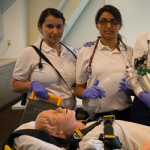Job Description
The Veterinary Hospital Managers Association explains that it is difficult to separate the levels of management at a veterinary hospital.
The reason is that the veterinary office manager, the veterinary practice manager, and the veterinary hospital manager positions build upon the knowledge and skills of the other two levels of veterinary manager positions.
The decision-making authority and the level of authority may vary, based on the needs of the practice and other criteria.
Office managers may also review the job applications for receptionists.
They may interview job candidates for receptionist positions, and perform the employment reviews of receptionists.
Duties
Some duties of veterinary office managers include:
- Scheduling appointments
- Preparing patient charts
- Handling correspondence
- Training and supervising front office staff
- Handling daily bank deposits, accounts payable and accounts receivable statements, and collections
Salary
Veterinary office managers across the U.S. earn a good salary.
The average salary for veterinary office managers, as of May 2024, is $86,159.
The site salary.com indicates that typically, the salary ranges between $75,006 and 98,996.
Several things affect the salary that office managers earn when they work at a veterinary clinic, a veterinary office, or a veterinary hospital.
People who have more experience or who have more education will earn more than co-workers who lack advanced education or experience.
Earning a certification or completing job-related training may also affect salary.
Annually National Average Salary: $121,200
Average Annual Salary by State
| State | Avg. Annual Salary |
|---|---|
| Alabama | $128,220 |
| Alaska | $110,710 |
| Arizona | $106,870 |
| Arkansas | $103,540 |
| California | $124,500 |
| Colorado | $161,860 |
| Connecticut | $130,050 |
| Delaware | $149,130 |
| District of Columbia | $133,570 |
| Florida | $107,500 |
| Georgia | $119,710 |
| Hawaii | $114,980 |
| Idaho | $83,740 |
| Illinois | $119,580 |
| Indiana | $106,110 |
| Iowa | $117,600 |
| Kansas | $119,030 |
| Kentucky | $108,370 |
| Louisiana | $103,160 |
| Maine | $103,680 |
| Maryland | $125,510 |
| Massachusetts | $137,250 |
| Michigan | $107,120 |
| Minnesota | $147,070 |
| Mississippi | $103,600 |
| Missouri | $99,260 |
| Montana | $113,170 |
| Nebraska | $107,910 |
| Nevada | $84,190 |
| New Hampshire | $121,020 |
| New Jersey | $146,190 |
| New Mexico | $111,720 |
| New York | $137,020 |
| North Carolina | $108,740 |
| North Dakota | $126,640 |
| Ohio | $101,170 |
| Oklahoma | $106,550 |
| Oregon | $115,590 |
| Pennsylvania | $110,420 |
| Rhode Island | $146,040 |
| South Carolina | $110,360 |
| South Dakota | $101,340 |
| Tennessee | $132,650 |
| Texas | $129,240 |
| Utah | $112,440 |
| Vermont | $96,870 |
| Virginia | $138,210 |
| Washington | $150,620 |
| West Virginia | $82,780 |
| Wisconsin | $120,590 |
| Wyoming | $114,940 |
| Guam | $60,500 |
| Puerto Rico | $74,410 |
| Virgin Islands | $68,000 |
Annual Average Salary: Top 5 States
The top earning state in the field is Colorado, where the average salary is $161,860.
These are the top 5 earning states in the field:
* Employment conditions in your area may vary.
How to Become a Veterinary Office Manager: Step-by-Step
Step 1 Learn Veterinary Office Manager and Veterinary Practice Manager Roles
The terms veterinary office manager and veterinary practice manager are sometimes used interchangeably.
They both have important roles in veterinary practices.
Knowing the role of each position is important so that future veterinary office managers understand the job duties and the type of education that they need to have for their careers.
Veterinary office managers handle the front office, administrative responsibilities, daily accounting responsibilities, and interactions with customers.
The duties may vary, based on the job description of individual veterinary offices, practices, or hospitals.
Veterinary practice managers know all the roles in a veterinary hospital, clinic, or office.
They interview, hire, train, and supervise support staff.
Veterinary practice managers review all accounts payable and receivables, handle marketing, and set budgets.
Learning the roles and the difference in job responsibilities helps future veterinary office managers pursue the proper education and meet other requirements for the position.
Step 2 Get the Required Education
The education requirements for veterinary office managers sometimes vary for several reasons.
Check the educational requirements in the geographical area where you want to work.
It is also important to check the educational requirements at any veterinary office, clinic, or hospital where you plan to apply for a veterinary office manager position.
Step 3 Complete Veterinary Office Manager Training
Completing veterinary office manager training may be a requirement for some veterinary practices.
The training does not have to be a long program.
Many people who want to become veterinary office managers complete training as part of an educational program, or after they get hired at a veterinary clinic, hospital, or other practice.
Future veterinary office managers who complete a training program will likely have an edge over other job applicants for the same position.
It also gives them first-hand experience of what it is like to work in an office management position at a veterinary practice.
Step 4 Apply for Veterinary Office Manager Jobs
Check with veterinary practices in your area for open or future veterinary office manager jobs.
View websites that support veterinary office managers, practice managers, and veterinarians.
They may have open job positions listed in your area, or other areas if you are willing to relocate for your career.
View job sites for office manager positions at veterinary practices.
Check several sites to have the best chance of finding your ideal job.
Popular Programs
Education
The education that is required to become a veterinary office manager varies more by the specific veterinary practice, not by state laws or regulations.
States have regulations that govern a variety of requirements for veterinarians, but not for veterinary office managers.
Earning a high school diploma or a GED is important for anyone who wants to work at a veterinary practice.
Showing proof of completing high school may be a requirement for getting hired after applying for a job as a veterinary office manager.
Get an edge over the competition by earning a degree or by completing a veterinary office manager program.
Several schools have programs for people who are interested in becoming veterinary office managers.
The Valdosta State University Office of Professional and Continuing Education offers an Online Veterinary Office Manager course.
Students complete Microsoft Excel certification training, Microsoft Office certification training, bookkeeping training, and veterinary assistant courses.
Baylor University, Georgia Southern University, and the University of New Hampshire are some other schools that offer a veterinary office manager course.
The program rules allow students up to 18 months to complete the course.
Many veterinary office managers earn a degree or complete a program in office management, rather than a veterinary office manager program.
Check with local veterinary practices to see what education they require for their office managers.
Video About The Career
Licensing and Certification
Certification and licensing are not required for veterinary office managers.
Many people who get a job in veterinary offices complete the certification requirements in a related area.
Completing the Certified Veterinary Practice Manager (CVPM) requirements allows veterinary office managers to advance their knowledge and skills.
The certification shows their commitment to their career.
It may also open doors for advancement in veterinary practice.
The Veterinary Hospital Managers Association (VHMA) is the accrediting association for the Certified Veterinary Practice Manager (CVPM) credential.
It is the highest level of certification for veterinary practice professionals.
The association describes the requirements for the certification.
The first step towards certification is to meet the qualifications.
Candidates must demonstrate that they have three years of practice management experience in “select duties.”
They must have completed at least 18 semester hours of management-related courses at a college or university.
Candidates must also have four letters of recommendation.
Once candidates complete the final qualification of having 48 hours of continuing education, they may apply for the Certified Veterinary Practice Manager credential.
Average Training Program Duration: 1-2 Years
Job Outlook
The job outlook for veterinary office positions exceeds that of many other career fields.
The Bureau of Labor Statistics (BLS) does not have a specific listing for veterinary office managers.
They list the job outlook for veterinarians, veterinary assistants, veterinary technologists, animal care workers, and other similar positions as having a “much faster than average” job growth outlook through at least 2032.
Valdosta State University notes that the job outlook for veterinary professionals is triple the projected growth rate for all other types of jobs.
The school also cites statistics showing the projected job growth for veterinary professionals from the Bureau of Labor Statistics.
Employment Growth Projection: 21%
2020
2030
That's a higher than average projected growth of 25,200
Should You Become a Veterinary Office Manager? (Data Driven Review)
Overall Satisfaction: High

A veterinary office manager is the first person that customers, and their pets, see in a veterinary practice.
The opportunity to interact with different people and to see different types of pets are some aspects of the job that may appeal to office managers at veterinary offices, clinics, or hospitals.
The American Veterinary Medical Association notes that several studies have measured the overall job satisfaction of veterinarians.
The effect of team effectiveness on overall job satisfaction for other staff, including office managers, was not frequently measured, until one notable study.
The study looked at factors such as burnout, exhaustion, job stress, and overall job satisfaction.
The results showed that 83.1 percent of study respondents indicated that they were satisfied with their job.
Nearly 30 percent of the study participants were veterinary office managers and other front office staff.
Average Salary: High

The salary for veterinary office managers is higher than the salary for many other types of jobs.
The salary range increases with more experience, more education, and more training.
One other factor that affects their salary is the geographic location where veterinary office managers work.
Veterinary office managers who work in California earn an average salary of $95,033.
The average salary for veterinary office managers in Arkansas is $78,491.
People who work as veterinary office managers in Michigan earn an average salary of $85,039.
Job Growth Outlook: High

The job growth outlook for veterinary practice office managers exceeds the job growth outlook for many other professions.
The Bureau of Labor Statistics lists the job growth outlook for jobs in veterinary practice as “much faster than average,” when compared to other professions.
The need for veterinary office managers will continue to grow, as pet owners seek quality care for their pets, and as the demand for qualified office managers in veterinary offices, clinics, and hospitals continues to grow over the next several years.
Education Duration: 1-2 Years

The education required to become a veterinary office manager is low, compared to the education that is often required of office managers in other professions.
Many people get hired as office managers at veterinary practices with only a high school education.
People who want to become veterinary office managers should not underestimate the value of having more than a high school diploma or a GED.
Completing a college degree or a course through the school’s extended learning department gives candidates an edge over other job applicants.
Extended learning programs at colleges or universities, or programs that are offered online, often last for as little as four months or may last up to 18 months.
Personal Skills Needed

Social Skills
- Veterinary office managers are the first people at the practice that pet owners meet when they arrive
- Veterinary office managers are the last people that customers see before they leave
- Pet owners may have feelings of fear, stress, or other emotions because of their sick or injured pet
- Meeting a calm, helpful veterinary office manager calms pet owners
Communication Skills
- Communicating with customers is an important duty and skill for veterinary office managers
- Having good communication skills helps office managers interact with pet owners, veterinarians, and support staff
- Communication skills for veterinary office managers include communicating effectively by phone, in person, and online
Attention to Detail
- Being detail-oriented is important for creating records and charts at veterinary practices
- Attention to detail is important for developing and implementing an inventory control system that is effective
- Attention to detail is important for all other duties of veterinary office managers
Management and Organizational Skills
- Veterinary office managers must have the ability to multitask
- Supervising receptionists and other support staff are important responsibilities
- Strong problem-solving skills are important for veterinary office managers
- Having strong organizational skills helps the veterinary practice to run smoothly
Frequently Asked Questions
How long do you have to go to school to become a veterinary office manager?
Earning a high school diploma or a GED is the minimum education that is required to become a veterinary office manager.
Many people who work as veterinary office managers complete a program or a course through a university continuing education or extended learning department.
Some office managers at veterinary practices earn a certification to become certified veterinary practice managers.
Earning the credential opens the door to job advancement opportunities.
It also may lead to earning a better salary.
How much money does a veterinary office manager make a year?
The salary that a veterinary office manager makes a year varies, according to the information listed on different sites.
Trust reputable sites, such as salary.com, that list accurate, up-to-date salary information for veterinary office managers, and other types of jobs.
What skills do you need to have to be a veterinary office manager?
Veterinary office managers need to have strong organizational skills, strong management skills, and strong communication skills.
They need to have interpersonal skills, time-management skills, and conflict-resolution skills.
The job also requires them to have patience and empathy.
Are veterinary office managers in high demand?
The demand for veterinary office managers is expected to grow for several reasons.
One reason is the increase in the number of people who own pets.
The increase in the types of pets that some people own is another reason that may lead to a higher demand for office managers at veterinary practices.
The job growth projections show the increased demand and job growth expectations for veterinary office managers.
What kind of education do you need to become a veterinary office manager?
A high school education is all that is needed for the office managers at many veterinary practices.
The fact that they need to stay up-to-date with the latest office technology skills and the duties of the job are some reasons that people often choose to complete a veterinary office manager college program or an extended learning course.
 Vet Office Manager Info by State
Vet Office Manager Info by State

Vet Office Manager Resources
- 10 Best Online Vet Office Manager Programs
- 14 Pros and Cons of Being a Vet Office Manager
- How Much Does Becoming a Vet Office Manager Cost?
More Medical Careers
| Career | |
|---|---|
 | Certified Nursing Assistant Working as a Certified Nursing Assistant is an entry-level role that will give you hands-on experience when you are ready to take the next step in your medical career. |
 | Dental Assistant Dental assistants help dentists to provide patient care, keep records, and care for the dental equipment. |
 | Dental Hygienist Dental hygienists take care of cleaning teeth to promote hygiene and help avoid cavities and gum problems. |
 | Dialysis Technician Dialysis technicians maintain and monitor dialysis equipment, and also act as primary caregivers for patients undergoing dialysis treatment. |
 | Dog Groomer Dog groomers attend to grooming dogs, usually at dog salons or big pet-related chain stores. |
 | Healthcare Administrator Healthcare administrators – also known as healthcare executives or health services managers – are responsible for the planning, direction, and coordination of medical and health services. |
 | Home Health Aide Home health aides provide home care to individuals who require assistance in their day-to-day living. |
 | Licensed Practical Nurse (LPN) Licensed Practical Nurses provide basic nursing care to patients and work with Registered Nurses and Doctors. |
 | Medical Assistant Medical assistants support the work of physicians, nurses, and other health professionals. |
 | Medical Biller and Coder Medical billers and coders manage, organize, and code various health information data. |
 | Medical Technologist Medical laboratory technologists collect bodily samples and conduct tests to analyze those samples. |
 | Medical Transcriptionist Medical transcriptionists go over voice recordings to convert them into written texts. |
 | Nutritionist As a Nutritionist, you’ll be tasked with creating meal plans, counseling, and understanding dietary restrictions for all types of clients. |
 | Patient Access Representative The work involves helping people to orient themselves to the space and everything that is going on. |
 | Patient Care Technician Patient care techs work directly with patients helping them with daily activities and assist the medical staff by measuring and monitoring the patients' vital signs among other tasks. |
 | Pharmacy Technician Pharmacy technicians provide patients with medications through prescription or over the counter. |
 | Phlebotomist As a Phlebotomist, it will be your responsibility to take blood samples from patients and send them to the lab for further testing. |
 | Physical Therapist Assistant Physical therapist assistants provide physical therapy services to patients and aide to physical therapists. |
 | Professional Recovery Coach A professional recovery coach is a life coach who works with someone during their addiction recovery process. |
 | Radiation Therapist Allied health provisional who specializes in radiation oncology treatments. |
 | Registered Health Information Technician Registered Health Information Technician (RHIT) help store and verify accuracy of health records as well as analyze patient data. |
 | Registered Nurse (RN) Registered Nurses provide hands-on patient care in various settings, mainly hospitals, and clinics. |
 | Respiratory Therapist Respiratory therapists treat and care for patients who experience breathing difficulties. |
 | Sterile Processing Technician A sterile processing technician is a healthcare professional who is responsible for preparing, sterilizing, maintaining, packaging, and storing medical tools and equipment used in surgical and other medical procedures. |
 | Surgical Technologist Surgical technologists – also known as operating room techs – prepare operating rooms and assist doctors and nurses during surgical procedures. |
 | Veterinary Assistant Veterinary Assistants work closely with Veterinarians to handle routine animal care. |
 | Veterinary Technician Veterinary Technicians assist veterinarians as well as diagnosing and treating animals, mostly in private clinics. |
 | EKG Technician EKG technicians test and monitor the cardiovascular system. |
 | EMT Trained emergency medical technician that arrives at the scene to provide medical services such as resuscitation. |
 | MRI Technologist MRI Technologists use a machine to scan the body and create a detailed image of the inside for doctors to analyze. |
 | Optician Opticians are technicians and salespersons at the same time who spends most of their day talking to customers, reading prescriptions written by doctors, and dispensing glasses and lenses. |
 | Ultrasound Technician Ultrasound technicians aid physicians in monitoring and diagnosing patients through the use of ultrasonic imaging technology. |
 | X-Ray Technician X-Ray Technicians are medical imaging professionals who use technology to visualize the inside of our bodies. |














